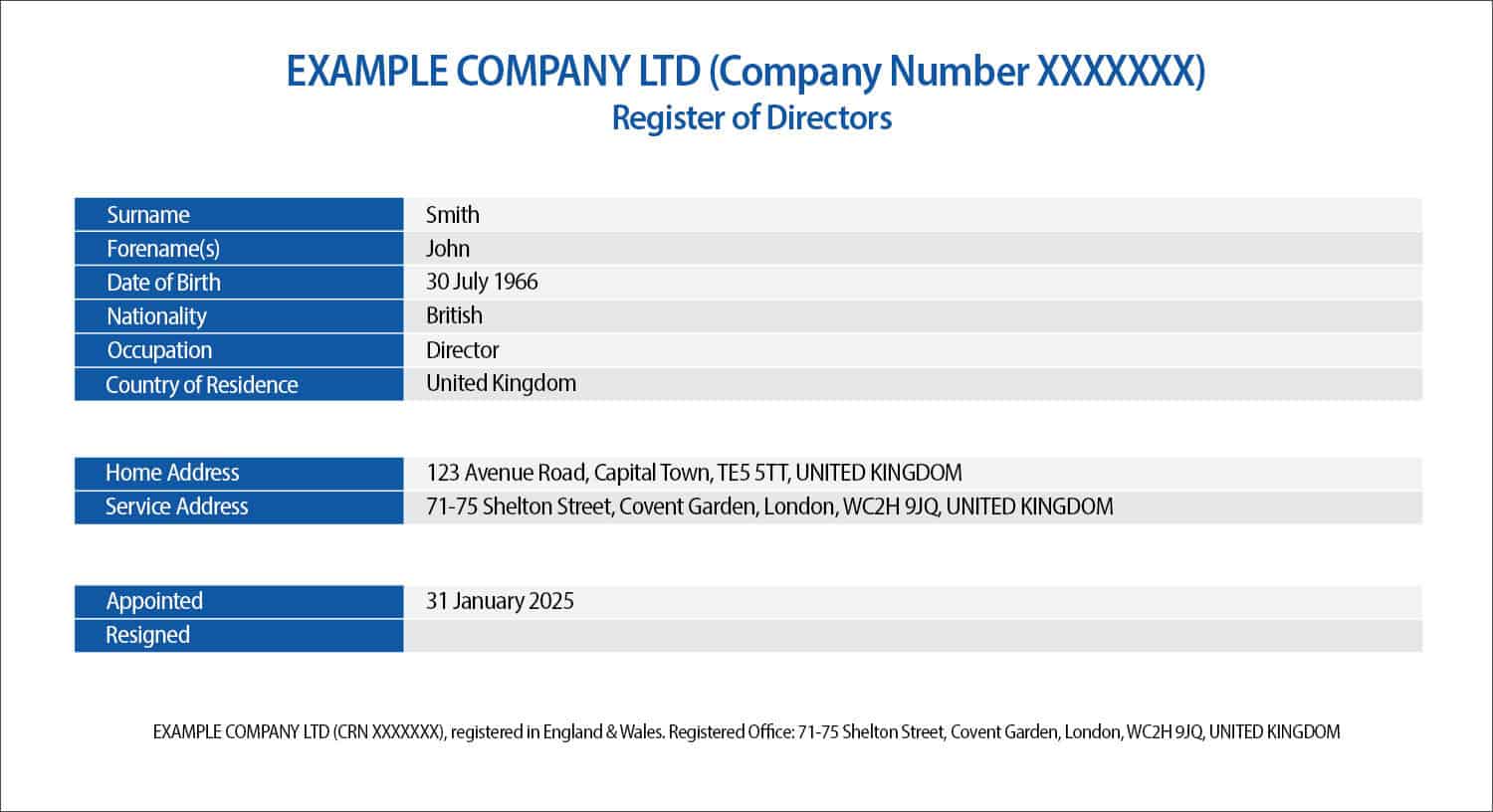The register of directors is one of several statutory registers that UK companies are required to keep, normally at their registered office address. It must include the name, service address, and other personal details of every director in the company.
This post outlines everything you need to know about the register of directors, including the information it must contain, how to update the register and notify Companies House, and where to get a register of directors for your limited company.
Key Takeaways
- The register of directors is a written record of all past and present directors in a UK company.
- Companies are legally required to maintain an accurate and up-to-date register of directors from the moment of incorporation.
- Most companies keep their registers electronically and make them available for inspection at their registered office.
What is the register of directors?
In a UK company, the register of directors is an official written record of every person appointed as a director since the company’s incorporation. They were traditionally kept in the form of large physical books, but most companies nowadays keep digital registers.
More than just a procedural formality to comply with company law, the register of directors enhances corporate transparency by providing a definitive record of a company’s historical and current director appointments. This information can also be beneficial in future disputes, investigations, legal claims, or sales.
Do all companies need to keep a register of directors?
In accordance with the Companies Act 2006, every UK-registered company must keep a statutory register of directors. This legal obligation applies to:
- Private companies limited by shares
- Private companies limited by guarantee
- Public limited companies (PLCs)
- Unlimited companies
The requirement to keep a register of directors does not apply to sole traders, general partnerships, limited liability partnerships (LLPs), or limited partnerships. These business structures do not have directors.
What information should the register of directors contain?
Section 163 of the Companies Act 2006 states that the register of directors must contain the following particulars of every individual person who is appointed as a director of a company:
- Full forename(s) and surname
- Former names (including maiden or married names) that have been used for business purposes within the last 20 years
- Service address (official correspondence address for the director)
- Country or state (or part of the UK) where they usually reside
- Nationality
- Business occupation (if they have one)
- Date of birth
- Date of appointment
- Date of removal as a director (where applicable)
If the director’s service address is the same as the company’s registered office, the entry in the relevant part of the register may simply state “The company’s registered office”.
In the case of a corporate director (e.g. another company acting as a director), the register of directors must contain the following particulars relating to the corporate entity:
- Registered name
- Registered office address or principal office
- If it is a UK firm – the company registration number
- If it is a non-UK body – the legal form of the company or firm, the law by which it is governed, the register in which it is entered (including details of the state), and its registration number in the register
- Date of appointment
- Date of removal as a director (where applicable)
The register should not contain any other information about company directors, such as home addresses, telephone numbers, or email addresses. This is for privacy reasons since the register of directors is a publicly available document.
Where to store the register of directors
Most companies keep their statutory registers at their registered office, including the register of directors and the register of directors’ residential addresses. Alternatively, private companies can:
- Keep their registers at a single alternative inspection location (SAIL address) – to designate a SAIL address for the company, form AD02 needs to be submitted to Companies House
- Elect to send details usually held in certain statutory registers to Companies House to be kept on the central public register (but only upon the agreement of all members)
If a company wishes to keep its registers at its SAIL address, the directors must notify Companies House on form AD03. Unless otherwise notified, Companies House will assume that a company’s statutory registers are stored and kept available for public inspection at its registered office address.
Are directors’ details available to the public?
All information in the register of directors must also be provided to Companies House for disclosure, together with the home address. This public register is available to view free of charge online. The only information not disclosed publicly is the day of the director’s date of birth (only the month and year are displayed publicly) and the director’s home address (unless it has also been specified as the service address).
During the company registration process, directors’ details will form part of the application to incorporate the company. Thereafter, director appointments, terminations, or any change of details must be reported to Companies House online or by post. Upon doing so, the public register will be updated accordingly.
Inspection of the register of directors
If a company elects to keep its statutory registers at Companies House, anyone can inspect them online anytime. However, when a company stores its registers at a registered office or SAIL address, it must keep them available for inspection for at least two hours every business day between 9am and 3pm.
Members of the company may inspect the registers free of charge. Non-members (i.e. the public) can also request to inspect and make copies of the company registers at a specified time for a prescribed fee set by the company.
Any inspection request to the company must include the following information:
- Name and address of the person making the request
- In the case of an organisation, the name and address of the individual responsible for making the request on the organisation’s behalf
- How the information obtained from the registers will be used
- Whether the information will be disclosed to a third party. If so, the identity of the third party and how they will use the information
The person making the request must give the company at least 10 days’ notice. However, only 2 days’ notice is required if the request is made during the notice period of a general meeting or the circulation period for a members’ written resolution.
Upon receiving a request, a company has 5 business days to comply with the request or apply to the court to deny access if the request is not sought for a proper purpose.
The register of directors’ usual residential addresses
In addition to the register of directors, companies must keep a separate register of directors’ usual residential addresses.
This is a private register containing the main home address of every director, past and present. Due to the sensitive nature of this information, it is not a matter of public record.
If a director’s usual residential address is the same as their service address, the company can simply enter “Same as service address” in the register.
However, where a director’s service address is stated as “The company’s registered office” in the register of directors, the company must enter the director’s full residential address.
What does the register of directors look like?
Many companies keep their statutory registers in a loose-leaf binder or a bound book. However, keeping registers electronically in a spreadsheet or using a simple table format is preferable. Provided that the information is accurate, up-to-date, and legible, directors can choose whichever format suits them best.
Below is an example of a basic digital register of directors for a private limited company.
 This will be perfectly suitable if your company has only one director. If there are multiple directors, you can create additional entries for each person or create a spreadsheet.
This will be perfectly suitable if your company has only one director. If there are multiple directors, you can create additional entries for each person or create a spreadsheet.
Who is responsible for maintaining company registers?
The directors of a company are legally responsible for maintaining all statutory registers. Some companies delegate this duty to a company secretary, but the directors remain ultimately responsible for ensuring all information in the registers is correct and current.
Unfortunately, many new directors and company secretaries are unaware of this requirement – or simply forget to maintain the registers. Where non-compliance occurs, the company and every officer in default commit an offence under Section 162 of the Companies Act 2006.
Any person guilty of such an offence is liable on summary conviction to a fine up to level 5 on the standard scale. A daily default fine up to one-tenth of the greater of £5,000 or level 4 on the standard scale will apply for continued contravention.
You must rectify the situation immediately if you don’t have company registers or haven’t kept them up to date. Depending on your company’s age and history, this may be a relatively simple exercise.
Updating information in the register of directors
Companies should create a register of directors with the first entries immediately after incorporation. It should contain the details of every person (individual or corporate) appointed as directors during the company formation process.
Thereafter, the company must update the register in the following circumstances:
- Upon the appointment of a new director
- Upon the termination of an existing director
- If a director changes their name or service address
- If any other details change – e.g. country of residence
Notification should be sent to Companies House within 14 days of any appointment or termination of a director or any changes to an existing director’s personal details.
You can do this online via Rapid Formations’ free Online Client Portal, which is available to existing and new customers (even if you didn’t register a company with us).
Alternatively, you can notify Companies House online or by post on the following forms:
- Appoint a director – form AP01
- Terminate an appointment of a director – form TM01
- Change the details of a director – form CH01
Upon receiving the appropriate form, Companies House will record the change and update the information on the public register.
Top tips for maintaining your company registers
Administrative tasks can be tedious and time-consuming, so many people push them to the bottom of their to-do lists. To make life as easy as possible and avoid any potential non-compliance issues, follow these tips:
- Ensure all statutory company registers exist and you know where they are. Don’t assume that someone else is handling this essential legal duty.
- Update your company registers as soon as possible after any changes occur.
- Remember to notify Companies House of any updates to the information in your registers. Some changes must be reported within 14 days, while others can wait until the next annual confirmation statement (e.g. details of shares and shareholders). However, it’s best to get into the habit of updating information at Companies House as soon as any changes occur.
- Outsource the maintenance of your registers to a professional company secretarial provider. This will provide peace of mind that your company registers are accurate, up-to-date, easily accessible, and available for public inspection. It will also reduce your administrative burden, saving you time and money in the long run.
Get a register of directors from Rapid Formations
At Rapid Formations, all our company registration packages provide digital company registers with first entries, including the register of directors.
We can also prepare, maintain, and store your company’s statutory registers as part of our Full Company Secretary Service. Available for only £149.99 per year, this all-inclusive service for companies also provides:
- A dedicated account manager, available by phone and email
- Up to 15 changes to your company per year (e.g. director appointments or resignations, share transfers, etc.), updated in your registers and at Companies House
- Preparation and filing of annual confirmation statement (including the Companies House filing fee of £34)
- Preparation and filing of dormant company accounts and a letter to notify HMRC of your company’s dormant status (if applicable)
- Monthly guidance notes drafted by our in-house solicitors to help you run your company
- An exclusive monthly newsletter with information about your service, key business news, and much more
Our Full Company Secretary Service is available to all UK companies. You don’t need to have registered your company with Rapid Formations to use it.
Thanks for reading
If you have any questions about the register of directors or would like to speak to someone about our services, please leave a comment below or contact our Company Formation Team.
For more limited company guidance and small business advice, explore the Rapid Formations Blog.
If you are ready to register a company, check out Rapid Formations homepage and get started by finding out if your company is name is available to use at Companies House.
Please note that the information provided in this article is for general informational purposes only and does not constitute legal, tax, or professional advice. While our aim is that the content is accurate and up to date, it should not be relied upon as a substitute for tailored advice from qualified professionals. We strongly recommend that you seek independent legal and tax advice specific to your circumstances before acting on any information contained in this article. We accept no responsibility or liability for any loss or damage that may result from your reliance on the information provided in this article. Use of the information contained in this article is entirely at your own risk.














Join The Discussion